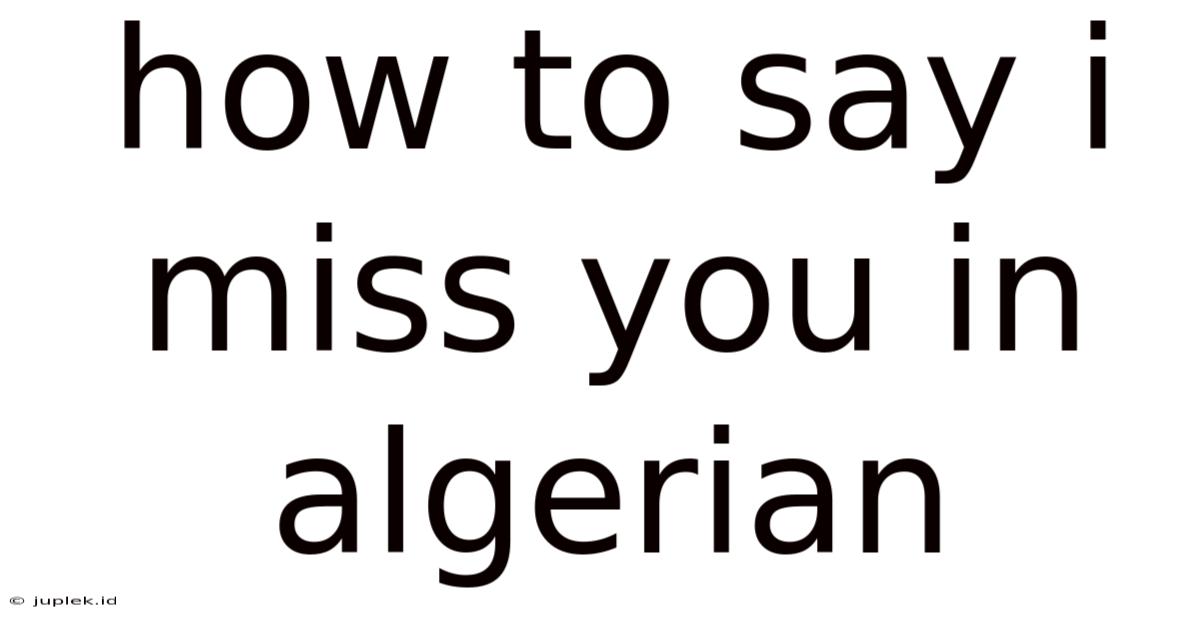How To Say I Miss You In Algerian

Discover more detailed and exciting information on our website. Click the link below to start your adventure: Visit Best Website meltwatermedia.ca. Don't miss out!
Table of Contents
How to Say "I Miss You" in Algerian: Navigating Nuances of Language and Culture
Saying "I miss you" transcends simple linguistics; it's an expression of deep emotion, heavily influenced by cultural context. In Algeria, a country with a rich tapestry of Berber and Arabic dialects, expressing longing isn't a straightforward translation. This article delves into the various ways to convey "I miss you" in Algerian Arabic, exploring the nuances, appropriate contexts, and cultural considerations that accompany each expression.
The Complexity of Algerian Arabic:
Before diving into specific phrases, it's crucial to understand the linguistic landscape of Algeria. Standard Modern Arabic (MSA) is the official language, but everyday communication thrives on diverse dialects, primarily Algerian Darija. This dialect varies considerably across different regions, making a single "perfect" translation impossible. Even within a region, the level of formality and the relationship between speakers heavily influence the choice of words.
Common Ways to Express Missing Someone in Algerian Darija:
Several expressions convey varying degrees of "I miss you" in Algerian Darija. The best choice depends on your relationship with the person you're addressing and the level of intimacy you wish to express.
-
واش نتا/نتي راكي/راك تفتقدني؟ (Wash nta/nti raki/rak teftiqdni?) - This translates literally to "Do you miss me?" It's a more indirect approach, perfect for initial inquiries or situations where direct declarations of affection might feel premature. The gendered pronouns (nta for male, nti for female, raki for female, rak for male) are crucial for grammatical accuracy.
-
نِتْفَقْدُكْ بزاف (Nitfaqduk bzaf): This means "I miss you a lot." "Nitfaqduk" is the verb "to miss you," conjugated in the first person singular. "Bzaf" signifies "a lot," intensifying the emotion. This phrase is suitable for close friends, family, or romantic partners.
-
أنا نِتْشَنْوَقْ لِكْ بزاف (Ana nitchanwq lik bzaf): This translates to "I long for you a lot." "Nitchangwq" (to long for) conveys a deeper, more intense longing than simply "missing" someone. This phrase works well in romantic contexts or with very close loved ones.
-
شْنُوْ خْبَارِكْ؟ (Chnou khbark?) / كَيْفَاحْ حالِكْ؟ (Kayfa7 halik?): While not directly translating to "I miss you," these are common greetings asking "How are you?" or "What's your news?". In certain contexts, particularly after a period of separation, asking this question can implicitly convey your longing. The tone of voice and the context are critical here.
-
واحشتيني بزاف (Wa7achtini bzaf): This translates to "You made me miss you a lot." This is a more passive-aggressive phrasing, implying that the absence of the other person caused the speaker to miss them intensely. Use this with caution, as it could be perceived as subtly reproachful.
-
راح نِتْغَيَّر بِلاياك (Rah nitghayyar bila yak): This phrase means, "I'll change without you." This expresses a deep longing and dependence on the other person. This phrase should be used with caution and only in very close relationships, potentially romantic ones.
Cultural Considerations:
Algerian culture, like many others, emphasizes indirect communication in certain situations. Openly declaring "I miss you" might be considered too direct or forward in some settings, especially early in a relationship or between individuals of differing social standing.
The appropriateness of a phrase also depends heavily on the gender of the speaker and the listener. Certain phrases might be more commonly used among women or within family circles than in other relationships.
Beyond Words: Non-Verbal Communication:
In Algerian culture, non-verbal cues often carry as much weight as words. A warm embrace, a prolonged gaze, or a heartfelt smile can convey a depth of longing that words alone cannot capture. These subtle gestures often supplement verbal expressions, reinforcing the message of missing someone.
Regional Variations:
Remember that Algerian Darija isn't uniform. The specific words and expressions used can vary significantly from one region to another. What's perfectly acceptable in Algiers might sound slightly different or even unfamiliar in Oran or Constantine.
Building a Deeper Understanding:
Learning how to express "I miss you" in Algerian Darija requires more than just memorizing phrases. It necessitates understanding the cultural nuances, the relationships between individuals, and the regional variations. Immersion in the language and culture is invaluable in mastering this aspect of communication. Listening to Algerian speakers, engaging in conversations, and seeking feedback are crucial steps in refining your expression.
Conclusion:
Expressing "I miss you" in Algerian Darija is a multifaceted process that involves more than simply translating words. It's about conveying emotion authentically, considering cultural sensitivities, and understanding the nuances of the language. By carefully selecting phrases and combining them with appropriate non-verbal communication, you can effectively express your feelings and build stronger connections with Algerians. The expressions listed above provide a starting point, but continued learning and engagement with the language and culture are essential for genuine and meaningful communication. Embrace the journey of learning, and your efforts will be rewarded with deeper understanding and connections.

Thank you for visiting our website wich cover about How To Say I Miss You In Algerian. We hope the information provided has been useful to you. Feel free to contact us if you have any questions or need further assistance. See you next time and dont miss to bookmark.
Also read the following articles
| Article Title | Date |
|---|---|
| How To Say Lawnmower In Mexican | Apr 08, 2025 |
| How To Say Presilha De Cabelo In English | Apr 08, 2025 |
| How To Say Winter Break | Apr 08, 2025 |
| How To Say Gossip In Filipino | Apr 08, 2025 |
| How To Say Happy Name Day In Greek | Apr 08, 2025 |
